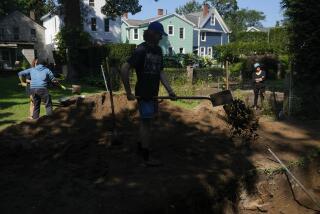Putting Names to Slavery Transactions
- Share via
NEW ORLEANS — In her younger days, she was a political radical who couldn’t hold a job, a civil rights lawyer’s daughter who was disgusted by the oppression of American blacks and intrigued by their stories.
Now 71 and a retired history professor, Gwen Midlo Hall is on a mission to shed light on America’s slaves and their personal histories through thousands of pages of handwritten, colonial-era documents salvaged from courthouse basements across Louisiana and as far away as France and Spain.
The records, now compiled on a CD-ROM database, cover more than 100,000 slaves, in what is believed to be the largest collection of its kind.
“I’d use the word ‘tremendous.’ It’s one of the more useful academic services someone could have performed,” says Donald DeVore, director of the Amistad Research Center, an archive on black history at Tulane University.
“We know, for example, that most blacks in America descended from West Africa, but because of Gwen’s work, some people, if they’re lucky enough to find their ancestors, will be able to get very specific,” DeVore said.
Unlike the English colonies, where slave transactions were kept private between buyers and sellers, Louisiana transactions were recorded in detail and filed by notaries, often in Spanish or French, Hall said.
Digging Unearths Family Secrets
In her searches, she has found court transcripts with testimony from slaves, documents that recount how slaves either bought or were granted their freedom, and even papers listing their birth countries and languages they spoke: Creole, French, Spanish, English, African languages and even American Indian ones among them.
Many of the slave names Hall came across were Afro European hybrids, such as Jean dit Mamadou. The slave owner called him “Jean,” but he was known among fellow slaves as “Mamadou,” an Islamic African name for “Mohammed.”
Her research also uncovered long-buried family secrets of slavery, like the 28-year-old slave named Kit, who a colleague of Hall’s discovered was sold for $975 by sugar-plantation owner Levi Foster to his in-laws in 1818.
The plantation owner was the great-great-grandfather of current Louisiana Gov. Mike Foster, who had said publicly he was not aware that his family ever owned slaves.
“He knew his family owned a sugar plantation before the Civil War,” Hall said. “Who does he think were out there cutting the canes? His relatives?”
Marsanne Golsby, the governor’s spokesman, said the governor believes the CD-ROM is a great resource for those whose family histories have been obscured, but that he is being unfairly singled out.
“I don’t think anybody wants to know bad things about their family’s past. It’s human nature,” Golsby said. “This was several generations back, and the man was born in 1930. There are lots of people in the South who didn’t know their relatives owned slaves.”
Hall’s project began in 1984, when she was a professor at Rutgers University in New Jersey doing research for her 1992 book, “Africans in Colonial Louisiana: The Development of Afro-Creole Culture in the 18th Century.”
While searching court records in New Roads, La., she found documents written by French-speaking notaries detailing the specific African origins and ethnicities of slaves.
By the time her book was published, she had collected 3,000 slave names and was determined to expand the project. The National Endowment for the Humanities contributed $300,000 in grants.
Some colonial government representatives took their files back to Europe, so Hall traveled overseas for part of her research and translated and transcribed her findings to computer files that the Louisiana State University Press released on CD-ROM in March.
“The data she provided is totally revolutionary and we didn’t know it existed until she discovered it,” says Tony Burroughs, who teaches genealogy at Chicago State University.
Halls began her search in the twilight of a career shaped by years abroad and a youthful radical bent. After dropping out of college at age 20, she moved with her first husband to Paris, became politically active and was divorced.
She moved to New York and married the late Harry Haywood Hall, a radical who wrote the book “Black Bolshevik.”
Gwen Midlo Hall said her connection to him made it hard for her to find work to support their children. She claims to have FBI files proving federal agents advised her bosses to fire her and landlords to evict her, something an FBI spokeswoman refused to confirm or deny.
“I finally decided the only way I could support myself and my two children was to finish college and apply for fellowships,” Hall said. “I credit the FBI with my career in academia.”
Hall’s research into slavery’s past has spawned similar efforts in the South.
Georgia Wise, 51, was helping researchers transcribe 1,500 slave documents in Natchez, Miss., for a Web-site database when she discovered her family had owned slaves.
“When one sees the names, enslaved people become human, not livestock, and the emotion is often overwhelming,” Wise said.
Hall suspects that more detailed slave documents exist in Haiti, Cuba and Brazil, and she intends to take her project hemisphere-wide.
“In the 15 years she devoted to this project she probably could have written three books,” DeVore says. “It’s a personal sacrifice she made because of her sensitivity to the individual lives of ordinary people.”
*
On the Net:
Afrigeneas genealogy site: https://www.afrigeneas.com
Amistad Center: https://www.tulane.edu/amistad/
More to Read
Sign up for Essential California
The most important California stories and recommendations in your inbox every morning.
You may occasionally receive promotional content from the Los Angeles Times.













